|
|
|
Sort Order |
|
|
|
Items / Page
|
|
|
|
|
|
|
| Srl | Item |
| 1 |
ID:
122296
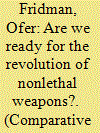

|
|
|
|
|
| Publication |
2013.
|
| Summary/Abstract |
This article presents a comprehensive Revolution in Military Affairs (RMA) model that is built on previous RMA research. This model examines the political, strategic, and military situation, and technological developments in the beginning of the second decade of the twenty-first century, and argues that nonlethal weapons have a potential to lie at the core of the next RMA.
|
|
|
|
|
|
|
|
|
|
|
|
|
|
|
|
| 2 |
ID:
122299
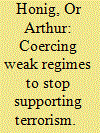

|
|
|
|
|
| Publication |
2013.
|
| Summary/Abstract |
Scholars tend to pessimistically argue that the weaker a regime is the harder it becomes for international actors to coerce it to fight the terrorist groups that it harbors/sponsors, since weak regimes are afraid that taking such an unpopular step could critically undermine their stability. Yet, this argument ignores the policy option that the coercing actor has of threatening to take steps which would undermine the stability of the weak regime unless it ceases its support for terrorist groups. Such a regime-threatening coercive strategy can overcome the problem of the weak regime's lack of political incentives because if the threat is credible, even a weak regime may conclude that it is politically cheaper to suppress the terrorists than face an externally triggered regime destabilization. Since weak regimes often care more about their survival than about national security interests, the regime-threatening coercive strategy has the best chances for success against such regimes. This article presents three different regime-threatening military coercive strategies and explores the conditions under which they are likely to be successful.
|
|
|
|
|
|
|
|
|
|
|
|
|
|
|
|
| 3 |
ID:
122297
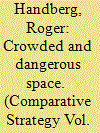

|
|
|
|
|
| Publication |
2013.
|
| Summary/Abstract |
U.S. success in conducting expeditionary operations globally has made GPS-equivalent capabilities essential for a modern military and also for a robust economy. As a result, other states are building independent satnav systems or in the Russia case replenishing and modernizing their GLONASS [Global Navigation Satellite System] system. One outcome is that future military operations involving multiple states may find other satnav systems being used in the regions. What consequences occur is the focus of this analysis.
|
|
|
|
|
|
|
|
|
|
|
|
|
|
|
|
| 4 |
ID:
122298
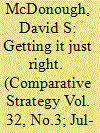

|
|
|
|
|
| Publication |
2013.
|
| Summary/Abstract |
Strategic culture provides a good starting point to explain Canada's goldilocks grand strategy. But it also has important theoretical shortcomings. This article offers an important reconceptualization of strategic culture. It synthesizes the insight from strategic culture and cybernetic theory to better account for Canadian strategic behavior. It introduces the notion of standing operational doctrines-continental soft-bandwagoning and defensive weak-multilateralism-through which Canada's strategic cultural beliefs, attitudes, and inclinations are standardized and regularized. This theoretical synthesis provides strategic culture with greater specificity, better use as a causal explanation, and can be potentially applied to other cases.
|
|
|
|
|
|
|
|
|
|
|
|
|
|
|
|
| 5 |
ID:
122295


|
|
|
|
|
| Publication |
2013.
|
| Summary/Abstract |
This article expands our understanding of how states respond militarily to threats and challenges by examining how organizational culture and institutional policymaking structures shape states' use of force. To evaluate the explanatory power of culture and institutions, I analyze the effect of each variable on how the United Kingdom and France conduct counterinsurgency operations. To preview the conclusions, although both organizational culture and institutional structures provide insights into how states fight insurgencies, institutional structures are much more decisive in shaping outcomes. In states where policymaking institutions promote maximal political control of the armed forces, the result will be strategic satisficing, whereby restricted force is surgically employed, along with diplomacy, to achieve the state's limited goals while minimizing the risks of casualties and/or escalation. Contrarily, in states where institutions accord operational autonomy to the armed forces, commanders will pursue their preference for decisive military victory by applying overwhelming force and conducting operations that risk escalating conflicts. In contrast to institutions, organizational culture plays a more modest role, limited to shaping how military leaders initially conceptualize the challenges they face and the techniques they employ at the tactical level. Thus, institutional structures, rather than organizational culture, offer a more convincing argument for why similar states, facing comparable challenges, use force in systematically different ways.
|
|
|
|
|
|
|
|
|
|
|
|
|
|
|
|
| 6 |
ID:
122300


|
|
|
|
|
| Publication |
2013.
|
| Summary/Abstract |
This article examines the nuclear nonproliferation policy of the Clinton administration (1993-2001) toward India. It is argued that initially President Clinton was focused on a "capping, rollback, and eliminate" approach toward Indian nuclearization. But, after India conducted nuclear tests in 1998, there was a discernible change in Clinton's policy toward India, which has largely gone unrecognized. The Clinton administration considerably shifted the nuclear goalposts-from the cap, rollback, and eliminate Indian nuclear weapons-to merely the exercise of nuclear restraint by India. This, in turn, implied a tacit acceptance of the nuclear weapons possessed by India. The Clinton administration cleared the languishing nuclear debris and created space for the next administration to reset the anomalous nuclear relationship with India.
|
|
|
|
|
|
|
|
|
|
|
|
|
|
|
|
| 7 |
ID:
122301
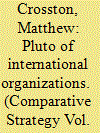

|
|
|
|
|
| Publication |
2013.
|
| Summary/Abstract |
This article investigates the peculiarities of the Shanghai Cooperation Organization (SCO). Unlike many more famous international organizations (IOs), the SCO is dominated by micro-agendas that seem to run counter to most of the theoretical literature applicable to IOs. This analysis examines these internal machinations and divergent interests through the theoretical lens, breathing new relevance into the institutional skepticism of Mearsheimer. Consequently, the SCO should not be considered a legitimate IO as traditionally framed. As such, it might be the "Pluto" of IOs that needs renaming and removal from the classification of IOs.
|
|
|
|
|
|
|
|
|
|
|
|
|
|
|
|
|
|
|
|
|